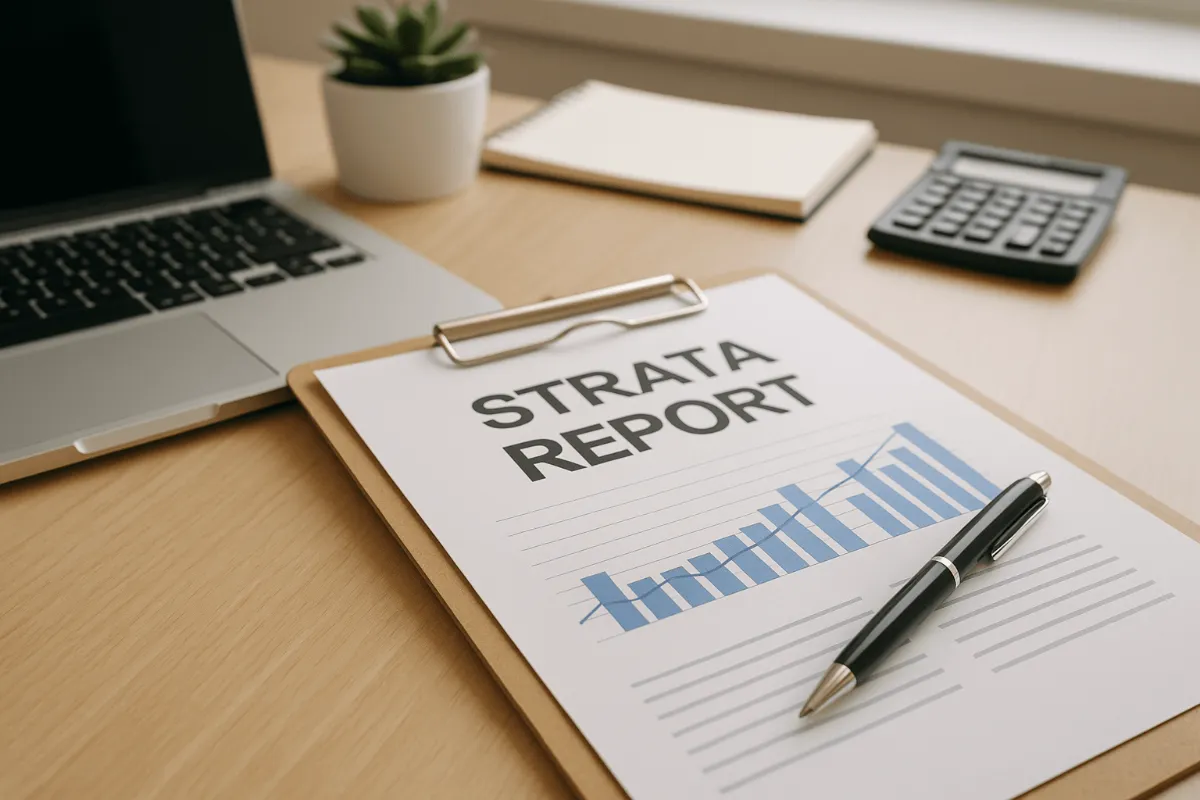What is a strata report?

Some of the most important details about a property aren’t visible on inspection. You’ve probably heard the term strata report, and if you’re wondering what that actually is, it’s a collection of records that outline how a particular scheme is run. They tend to come up when someone’s looking to buy into strata, but the insights they offer are just as useful long after the contract’s been signed.
At All Suburbs Strata Management, we have more than 40 years of experience in residential strata management in Greater Sydney, Nepean and the Central Coast. In NSW, strata reports play a key role in documenting how a scheme is run, and they help current owners, buyers and residents to make more informed decisions.
What information does a strata report include?
Often called a Section 184 Certificate, a strata inspection report is a formal document required in some situations under NSW law. It’s requested through the owners corporation or strata manager, and carries legal significance once signed and sealed.
A strata report is a detailed summary of the records held by the owners corporation for a particular scheme. It’s typically compiled by a strata search agent or reporting specialist who reviews documents such as meeting minutes, financial statements, by-laws and correspondence.
Although there’s no law requiring buyers to obtain a strata report before purchasing a property, it is one of the most efficient ways to assess how well a scheme is functioning. The report brings together key facts in one place and helps prospective owners understand the financial and operational standing of the building they’re considering.
What information does a strata report include?
Financial records
A strata report clearly outlines the current standing of the administrative and capital works funds. It includes a breakdown of regular levy contributions, any overdue amounts or credits, and whether early payment discounts apply. Together, these details give you a clearer picture of the scheme’s cash flow and whether it’s preparing adequately for future expenses.
Maintenance and repairs history
Understanding how a building handles upkeep tells you a lot about its long-term condition. A strata report will show records of previous repairs and any major works that are planned, such as defect rectification or upgrades to shared infrastructure like lifts. It also outlines any special levies that have been raised, along with the reasons they were introduced.
Governance documentation
This set of documents offers insight into how the scheme is run day to day and how well it’s governed. You’ll find everything from recently updated by-laws to meeting minutes that reflect how decisions are made and followed through. The report also confirms insurance cover against the current valuation and identifies key contacts, including committee members, strata managers or building managers.

Who uses strata reports and when?
As mentioned earlier, strata reports are most commonly discussed during the purchase process, when buyers and conveyancers are doing their due diligence. Knowing about potential risks before signing is important, and these reports help flag issues like low balances, frequent special levies, unresolved defects or legal disputes.
Existing owners may also request updated reports to keep track of how the scheme is being run, particularly if they’re thinking about selling. They’re usually looking for anything that might affect property value or day-to-day living, such as upcoming repairs, changes to fund balances or newly introduced by-laws.
During meetings or planning sessions, strata managers, committees and owners corporations may rely on the strata report to guide financial decisions. It brings together key data on income, expenses, scheduled upgrades and general governance. Having this detail on hand supports more transparent conversations when discussing budgets, timelines or funding requirements with residents.
Who prepares strata reports, and what makes them credible?
Strata reports aren’t prepared by strata managers or committee members. Instead, buyers, their representatives or anyone else seeking the report usually engage a specialist strata inspection company. These providers are independent from the owners corporation and base their reports on a thorough review of the scheme’s records, including minutes, finances and compliance documents.
While there’s no formal licensing requirement in NSW for strata report providers, they do need a strong understanding of the Strata Schemes Management Act 2015. Inspectors must be able to interpret the records accurately and spot potential red flags. Many come from legal, property or strata management backgrounds, which helps them focus on the issues that matter most to the people requesting the report.
Because there’s no formal accreditation or governing body, a provider’s credibility comes down to experience, transparency and professionalism. The most reputable companies hold professional indemnity insurance and clearly outline how their reports are compiled. Some also have ties to industry groups like the Australian Institute of Conveyancers or long-term relationships with buyer’s agents and legal professionals. It’s always worth reviewing their process and checking for any disclaimers or limitations.

Why Choose All Suburbs Strata Management?
Whether you’re looking to buy into strata, preparing to sell, or simply curious about what a strata report is, the answer is straightforward. It’s a reliable record that reflects the overall health and management of the scheme.
At All Suburbs Strata Management, we work with strata schemes to ensure records are maintained clearly and transparently. If you’re unsure what your strata records say or you need a professionally reviewed inspection report, we can help.
Need a strata manager you can rely on? ASSM brings over 40 years of expertise across residential, community, commercial and industrial properties. If your current manager is falling short, contact our experienced team today. We’ll ensure the handover is smooth and hassle-free.











